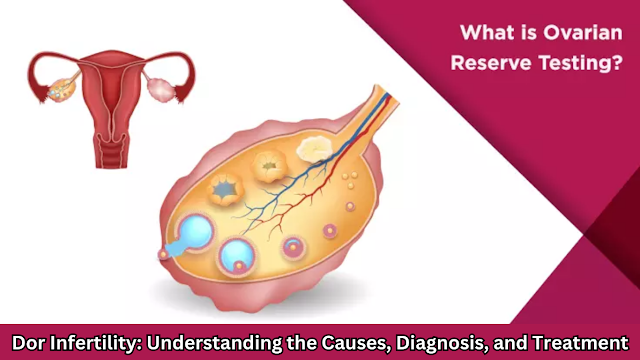Introduction
Infertility can be a daunting and emotionally challenging journey for couples who dream of starting a family. One of the lesser-known causes of infertility is Dor infertility. In this comprehensive guide, we will delve into the depths of Dor infertility, exploring its causes, diagnosis, and available treatments. Let's embark on this journey together.
What is Dor Infertility?
Defining Dor Infertility
Dor infertility, also known as Diminished Ovarian Reserve infertility, is a condition that affects a woman's reproductive ability due to a reduced number of high-quality eggs in her ovaries. This condition often leads to difficulties in conceiving naturally.
Understanding Ovarian Reserve
To comprehend Dor infertility, it's essential to understand ovarian reserve. Ovarian reserve refers to the number and quality of a woman's eggs. A healthy ovarian reserve is crucial for successful conception and pregnancy.
Causes of Dor Infertility
Age-related Factors
Advancing Age: As women age, the quantity and quality of their eggs naturally decline. This is one of the primary causes of Dor infertility.

Medical Factors
Ovarian Surgery: Previous ovarian surgeries can diminish ovarian reserve.
Chemotherapy and Radiation: Cancer treatments like chemotherapy and radiation therapy can harm the ovaries.
Endometriosis: Severe endometriosis can lead to Dor infertility.
Diagnosis of Dor Infertility
Hormone Testing
FSH Levels: High levels of Follicle-Stimulating Hormone (FSH) indicate a reduced ovarian reserve.
AMH Levels: Anti-Mullerian Hormone (AMH) blood tests can assess ovarian reserve.
Antral Follicle Count
Ultrasound Examination: Transvaginal ultrasound helps count antral follicles, providing insights into ovarian reserve.
Ovarian Reserve Testing
Clomiphene Citrate Challenge Test (CCCT): This test evaluates how the ovaries respond to stimulation.
Genetic Testing
Karyotype Testing: Identifying chromosomal abnormalities that may affect fertility.
Treatment Options for Dor Infertility
Lifestyle Changes
Diet and Exercise: Maintaining a healthy lifestyle can positively impact fertility.
Fertility Medications
Clomiphene Citrate: Stimulates ovulation in women with Dor infertility.
Intrauterine Insemination (IUI)
IUI Procedure: Enhancing the chances of fertilization by placing sperm directly into the uterus.
In Vitro Fertilization (IVF)
IVF Process: Retrieving eggs, fertilizing them in a lab, and implanting embryos into the uterus.
Egg Donation
Egg Donor Programs: Using eggs from a healthy donor to increase the chances of conception.
Gestational Surrogacy
Surrogacy: Carrying an embryo for another person or couple who cannot conceive naturally.
Conclusion
Dor infertility can be a challenging obstacle for couples trying to conceive. However, with advancements in medical technology and fertility treatments, there is hope for those affected by this condition. If you or a loved one are facing Dor infertility, consult a fertility specialist to explore the most suitable options for your unique situation.
FAQs
Can Dor infertility be prevented?
Unfortunately, Dor infertility cannot be entirely prevented, but a healthy lifestyle can help maintain optimal ovarian health.
Is Dor infertility more common in older women?
Yes, Dor infertility is more prevalent in women over the age of 35 due to the natural aging process.
Are there any natural remedies for Dor infertility?
While no natural remedies can reverse Dor infertility, lifestyle changes like a balanced diet and regular exercise may improve overall fertility.
What is the success rate of IVF for Dor infertility?
The success rate of IVF varies depending on individual factors, but it offers a viable option for many couples struggling with Dor infertility.
Can emotional support be beneficial for those with Dor infertility?
Yes, emotional support, such as counseling and support groups, can significantly help individuals and couples cope with the emotional toll of Dor infertility.
